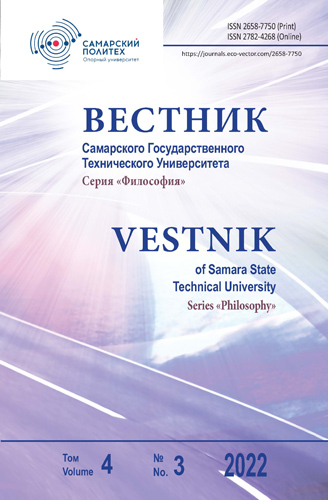Том 4, № 3 (2022)
Статьи
От цифры к человеку: время антропологического поворота?
Аннотация
В статье рассматриваются актуальные проблемы современной социокультурной динамики. Анализируются тенденции развития социума в ситуации цвишенизма и диссипации классической системы ценностей. Обосновывается идея необходимости нового антропологического проекта. Акцентируется важность переосмысления традиционных универсалий культуры. Показана неправомерность редукционистского отождествления понятий «ум» и «интеллект». Сформулирован и проанализирован ряд насущных проблем современного образования. Выявлена тенденция рассинхронизации образования с потребностями рынка труда. Доказывается необоснованность излишнего упования на цифровые практики и дистанционное обучение в педагогическом процесс. Излагаются соображения на предмет традиционных вопросов педагогики «кого, чему и как сегодня учить».
 5-22
5-22


Человеческое бытие в мире без альтернативы: активный или пассивный антропоцентризм
Аннотация
В статье обсуждается вопрос о необходимости выработки Человеком такого способа бытия в Мире, который исключал бы возможность мировоззренческого и практического, антропоцентризма. Отмечается, что западный способ бытия изначально антропоцентричен. При этом антропоцентризм здесь выступает в двух модусах — как активный и как пассивный. Подчеркивается, что, восточный способ бытия является онтологически приемлемым, однако он не ориентирует Человека на то, чтобы быть со-работником космогенеза. Делается вывод, что искомый способ бытия человека в Мире может быть выращен из синтеза того, что представлено в восточном и западном способах человеческого бытия.
 23-40
23-40


Революция 1917 года в интерпретации Ивана Ильина и евразийцев: два вектора русской консервативной публицистики 20–30-х гг.
Аннотация
Проводится сравнительный анализ двух трактовок Русской революции, представленных в публицистических работах Ивана Ильина и евразийцев. И Ильин, и евразийцы усматривали духовные истоки и предпосылки революции в умонастроении русского предреволюционного общества, прежде всего — русской интеллигенции. Разделяя общую установку на ценностный примат национальной самобытности, Ильин и евразийцы радикально расходились в оценках сущности и перспектив русского большевизма. Это расхождение объясняется несовпадением фундаментальных исторических презумпций. Для евразийцев советское государство было продолжением многовековой истории России-Евразии. Ильин же усматривал в русской революции катастрофический разрыв исторической преемственности.
 41-47
41-47


Ценности святогорской культурной традиции
Аннотация
На основе аксиологического анализа сочинений Нила Сорского и Иннокентия Комельского выделены ценности святогорской (афонской) культурной традиции в России. Ее специфическими ценностями являются сохранение себя, новоначалие, средний путь, общительное житие, внутреннее делание.
 48-54
48-54


Программа трансдисциплинарного диалога в современной науке: парадигмальные основания
Аннотация
В качестве парадигмальных оснований программы трансдисциплинарного диалога в современной науке рассматриваются формирование детермминизма нового типа, переход от аналитик бытия к аналитикам становления, отказ от жесткой номотетики и традиционного толкования субъект-объектной оппозиции. Рассмотрены тенденции преодоления междисциплинарных границ в современной науке, приводящие к сближению естественных и гуманитарных наук, в том числе — к адаптации естествознанием ряда методологических установок гуманитаристики.
 55-66
55-66


Междисциплинарное взаимодействие и феномен ложной аналогии в контексте социальной реальности
Аннотация
В статье рассмотрен феномен ложной аналогии в ее различных аспектах, включая формирование, значение и восприятие, как в различных областях науки и культуры, так и в обыденном сознании. Показано, что ложная аналогия, являясь постоянным спутником процесса познания, имеет свои особенности в гуманитарном, естественно-научном и технико-технологическом знании.
 67-74
67-74


Информационные войны современного мира
Аннотация
В работе раскрывается сущность информационной войны, исследуется специфика ее развертывания в современном мире. Информация выступает в качестве символического капитала, используемого субъектами для осуществления манипулирования действиями множества субъектов и формирования общественного мнения. Информационная война становится бесконтактным, глобальным и всеобъемлющим способом воздействия на социальную реальность. Выявление особенностей проявления данного феномена является необходимым условием урегулирования противоречий.
 75-80
75-80


Проблема веры и доверия в философских идеях Мартина Бубера и Льва Шестова
Аннотация
В статье обсуждается проблематика двух «образов веры» в двух аспектах: образа веры как подобия образу жизни, как способа мышления; и образа веры как переживания представления высшей реальности. Автор апеллирует к работам Л.И. Шестова и М. Бубера, имевших сходное «кровное» происхождение, воплощавших экзистенциальную традицию в философии, Л.И. Шестов в истории остался как русский философ, М. Бубер — как еврейский, при этом они оба вышли из своего национального, перешли в более широкое культурное поле, обогатив его. Оба они в своих философских исканиях соотносятся как с иудаизмом, так и с христианством — религиозными истоками двух способов мышления в культуре. А сформировавшийся в современности феномен «бедной веры» открывает человеку возможность вернуться к религиозному опыту «до», «после» и «вне» религий, в непосредственном взаимодействии с Создателем.
 81-88
81-88


Эндофизика «точки» как объект изучения науки будущего
Аннотация
Доказывается, что введение в научный оборот постнеклассического понятия «суперточки» позволит более глубоко понять сущность Бытия, изменить науку и цивилизацию в целом. Выявлено, что «точка» — бесконечный фрактал мироздания и пространства. Установлено, что внешние связи «точки» формируют физический космос, а внутренние — внефизическую реальность. Дана интерпретация геометрических представлений о структурных элементах пространства («комплексная точка», аксиома Кантора, 1872). Представлена новая версия концепции «фридмонов», обоснована четвертая характеристика пространственных форм, т. е. их глубина. Разработаны новые представления о «пространстве» и «времени», форме и структуре Вселенной. Раскрыт механизм вхождения человечества в мир четырех измерений.
 89-96
89-96


Рецензия на книгу В.И. Курашова «Познание природы во взаимодействиях научных знаний». М: «КДУ», 2021
Аннотация
Рецензия посвящена книге известного казанского философа науки В.И. Курашова: Познание природы во взаимодействии научных знаний / В.И. Курашов: М.: «КДУ», «Университетская книга». 2021. 354 с. DOI: 10.31453/kdu.ru.91304.0146. Как отмечается в рецензии, работа посвящена проблемам познания природы в системе современных представлений естествознания. Автор монографии пытается по-новому взглянуть на интерпретации феноменов знания о природе в их системной взимосвязанности.
 97-103
97-103












